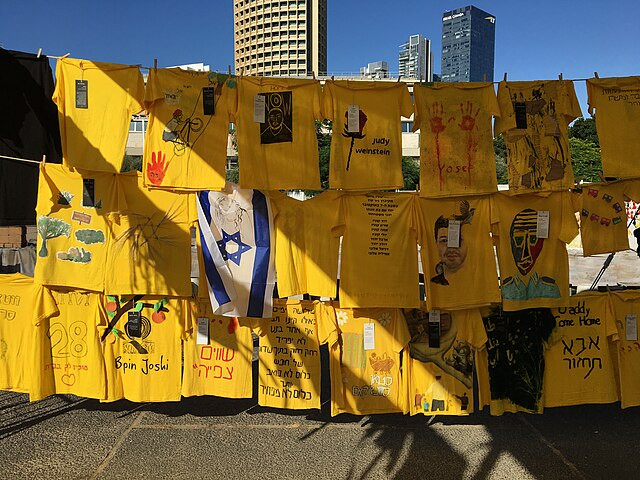Three Israeli hostages were released Saturday in exchange for 183 Palestinian prisoners as the ceasefire agreement between Israel and Hamas continued to hold. The latest exchange marked the fifth round of swaps under the first phase of the deal, which began on January 19.
Ohad Ben Ami, 56, Eli Sharabi, 52, and Or Levy, 34, were transferred to the Red Cross in Deir al-Balah, central Gaza, before being transported to Israel. The three men, held in captivity for 491 days, appeared visibly frail when they were led onto a makeshift stage before their release. The images of their gaunt appearances prompted outrage in Israel.
"These are men who have endured hell itself," the Hostages and Missing Families Forum in Tel Aviv said in a statement. "There can be no more delays - a second stage of the hostage deal must be implemented immediately!"
The Israeli government also condemned the conditions of the released hostages, calling their treatment "shocking" and vowing that it "would not go unaddressed." Prime Minister Benjamin Netanyahu's office issued a statement saying he had instructed officials "to take appropriate measures" in response, though no specific actions were outlined.
Ben Ami and Sharabi were kidnapped from Kibbutz Be'eri on October 7, when Hamas launched its assault that killed 1,200 people in Israel. Ben Ami's wife, Raz, was also taken but was freed in a previous exchange. Sharabi's wife and daughters were killed in the attack. His brother, Yossi, who was also kidnapped, later died in Gaza, according to the Israeli military.
Levy was taken hostage while attending the Nova music festival with his wife, Einav. She was killed in the attack. Upon his return to Israel, Levy was reunited with his three-year-old son.
The prisoner exchange came amid heightened geopolitical tensions, including comments from former U.S. President Donald Trump suggesting that Palestinians in Gaza could be transferred to other countries. His remarks sparked international condemnation, with British Prime Minister Keir Starmer asserting that Palestinians "must be allowed home" and France's Ministry of Foreign Affairs rejecting "any forced displacement." Hamas dismissed Trump's proposal as a "recipe for creating chaos and tension in the region."
Meanwhile, Israel freed 183 Palestinian prisoners Saturday. Many of those released appeared weak and malnourished, prompting further scrutiny of conditions inside Israeli detention facilities. Video footage from Ramallah showed some detainees struggling to walk, with one man requiring assistance.
Among those released, 18 had been serving life sentences, 54 had lesser sentences, and 111 were detained after October 7. Palestinian prisoners' rights groups have accused Israel of drastically reducing food rations for detainees, a practice reportedly implemented under then-National Security Minister Itamar Ben-Gvir.
Ben-Gvir has previously advocated for the execution of Palestinian prisoners, stating in April 2024, Palestinian prisoners "should be killed with a shot to the head." His policy proposals, including a bill seeking to authorize executions, have drawn criticism from international human rights organizations.
Saturday's exchange was part of a broader deal that has so far seen 18 Israeli hostages freed in return for over 550 Palestinian prisoners. As negotiations for a second phase continue, Hamas and allied groups still hold 73 people captured in Israel on October 7, in addition to three hostages taken in 2014. The fate of eight others initially included in the deal remains unclear.
The future of the ceasefire remains uncertain. While Hamas has indicated willingness to negotiate further exchanges, Israeli Finance Minister Bezalel Smotrich has warned that he would resign if a second phase of the deal includes a full Israeli troop withdrawal from Gaza. Netanyahu has also signaled reluctance to commit to a more comprehensive agreement.
With the ceasefire set to expire on March 1, regional and international stakeholders continue efforts to broker an extension. The conflict has already resulted in over 45,000 Palestinian deaths, according to the Hamas-run Ministry of Health in Gaza, and has drawn Israel into escalated confrontations with Iran-backed groups across the region.




